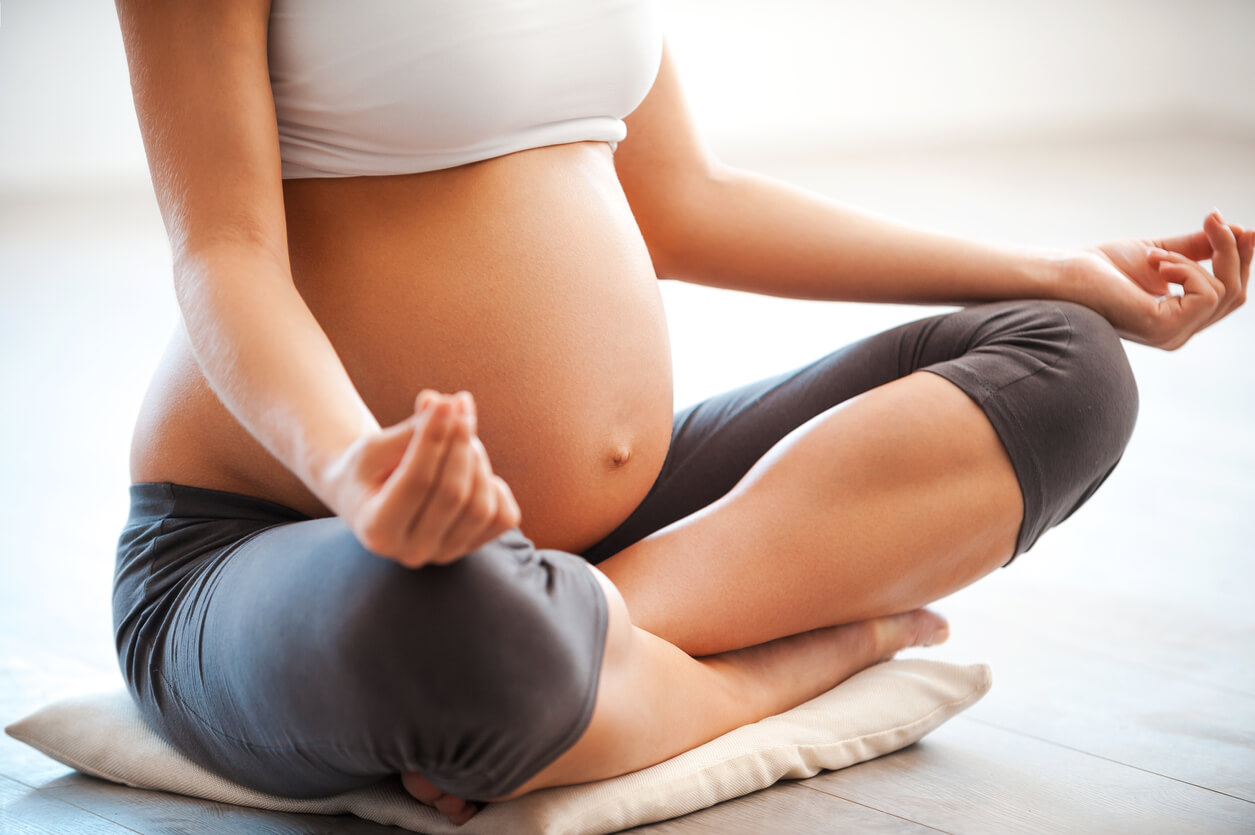How to Stimulate Your Baby During Pregnancy


Written and verified by the teacher Samanta Ruiz
Did you know that children have the ability to use their senses from the time they’re in the womb? For this reason, it’s very important that you know how to stimulate your baby during pregnancy to promote their full development.
Prenatal stimulation helps the growth of the central nervous system and the brain and also helps to initiate communication with their parents. Research on this fascinating topic is constantly revealing new things, but moms have known since ancient times that babies respond to external stimuli in an active way.
Stimulation techniques beneficial for you and your baby
Discover what kind of stimulation you can practice according to the time of gestation and begin to relate to your little one from the moment you know of their existence. Let’s learn how to do it!
Stimulate your baby during pregnancy through touch
From the seventh week, the baby already has senses. First, in the mouth area, and then, they gradually extend to the genitals and the soles of the feet. By the twentieth week, all their skin is already formed and reacts to stimuli. In this regard, it will be pleasant for your child if you do the following:
- Touch and rub your belly.
- When you feel a kick, push on their foot to establish contact.
- Bathe with the water at a comfortable temperature and let it run over the skin of your abdomen so that the baby has the same feeling of well-being as you.
- Massage your belly while rubbing in creams or oils to moisturize your skin.

Stimulate your baby during pregnancy through sound
From the 28th week, your baby can already hear and responds to external sound stimuli. Experts even believe that babies recognize their mother’s voice and hear its heartbeat even sooner. Some exercises to stimulate hearing are the following:
- Talk to your baby in a calm tone, both mom and dad, so they recognize both of your voices.
- Tell them what you’re doing.
- Listen to calm and relaxing music, such as classical music or some children’s songs.
- Read poetry and stories aloud to your child.
Stimulate your baby’s sight
The formation of the sight organs is slow, and it’s only in the sixth month of pregnancy that your baby opens their eyelids. In the eighth month, they react to the stimulus of light. You can do the following to help your baby’s vision develop:
- Bringing a soft light close to your belly to stimulate their eyes.
- Watch movies or TV shows with fun colors and sounds.
The sense of taste
Between weeks 6 and 12, taste develops. Babies respond differently to food ingested by the mother and behave differently depending on the taste. To help your baby feel comfortable and begin to develop their sense of taste, here are some tips:
- Choose your meals carefully. Try not to eat spicy products.
- Avoid substances that alter tastes or are stimulants, such as alcohol and cigarettes.
- Eat a varied and healthy diet. In particular, increase the amount of fruits and vegetables.
The sense of smell
The sense of smell isn’t a sense that can be stimulated in the womb. However, we know that babies recognize their mother by her smell and that this calms them.

Prenatal stimulation and emotions
Apart from the senses, there’s another type of stimulation that has to do with emotions and affects the baby’s emotional development. Epigenetics studies the influence of external factors on the formation of DNA. In other words, it’s not only genetic information that determines a person’s character and health, but also feelings, history, well-being, and the environment.
This is why, for example, identical twins have different personalities or different health problems.
“It’s the external environment (habits, attitudes, food, air, water, thoughts, emotions) that influences the internal cellular environment, the metabolic network that generates an epigenetic network according to which the so-called genes are activated or silenced.”
– Bruce Lipton –
Transmit well-being to your baby
If you’re pregnant and the situation causes you anxiety, look for some activity that relaxes you, such as prenatal yoga or gym classes. These types of exercises will help you sleep more comfortably, reduce stress, and improve your physical condition for childbirth. In addition, transmitting your sense of well-being and comfort is also a way to stimulate your baby during pregnancy.
Did you know that children have the ability to use their senses from the time they’re in the womb? For this reason, it’s very important that you know how to stimulate your baby during pregnancy to promote their full development.
Prenatal stimulation helps the growth of the central nervous system and the brain and also helps to initiate communication with their parents. Research on this fascinating topic is constantly revealing new things, but moms have known since ancient times that babies respond to external stimuli in an active way.
Stimulation techniques beneficial for you and your baby
Discover what kind of stimulation you can practice according to the time of gestation and begin to relate to your little one from the moment you know of their existence. Let’s learn how to do it!
Stimulate your baby during pregnancy through touch
From the seventh week, the baby already has senses. First, in the mouth area, and then, they gradually extend to the genitals and the soles of the feet. By the twentieth week, all their skin is already formed and reacts to stimuli. In this regard, it will be pleasant for your child if you do the following:
- Touch and rub your belly.
- When you feel a kick, push on their foot to establish contact.
- Bathe with the water at a comfortable temperature and let it run over the skin of your abdomen so that the baby has the same feeling of well-being as you.
- Massage your belly while rubbing in creams or oils to moisturize your skin.

Stimulate your baby during pregnancy through sound
From the 28th week, your baby can already hear and responds to external sound stimuli. Experts even believe that babies recognize their mother’s voice and hear its heartbeat even sooner. Some exercises to stimulate hearing are the following:
- Talk to your baby in a calm tone, both mom and dad, so they recognize both of your voices.
- Tell them what you’re doing.
- Listen to calm and relaxing music, such as classical music or some children’s songs.
- Read poetry and stories aloud to your child.
Stimulate your baby’s sight
The formation of the sight organs is slow, and it’s only in the sixth month of pregnancy that your baby opens their eyelids. In the eighth month, they react to the stimulus of light. You can do the following to help your baby’s vision develop:
- Bringing a soft light close to your belly to stimulate their eyes.
- Watch movies or TV shows with fun colors and sounds.
The sense of taste
Between weeks 6 and 12, taste develops. Babies respond differently to food ingested by the mother and behave differently depending on the taste. To help your baby feel comfortable and begin to develop their sense of taste, here are some tips:
- Choose your meals carefully. Try not to eat spicy products.
- Avoid substances that alter tastes or are stimulants, such as alcohol and cigarettes.
- Eat a varied and healthy diet. In particular, increase the amount of fruits and vegetables.
The sense of smell
The sense of smell isn’t a sense that can be stimulated in the womb. However, we know that babies recognize their mother by her smell and that this calms them.

Prenatal stimulation and emotions
Apart from the senses, there’s another type of stimulation that has to do with emotions and affects the baby’s emotional development. Epigenetics studies the influence of external factors on the formation of DNA. In other words, it’s not only genetic information that determines a person’s character and health, but also feelings, history, well-being, and the environment.
This is why, for example, identical twins have different personalities or different health problems.
“It’s the external environment (habits, attitudes, food, air, water, thoughts, emotions) that influences the internal cellular environment, the metabolic network that generates an epigenetic network according to which the so-called genes are activated or silenced.”
– Bruce Lipton –
Transmit well-being to your baby
If you’re pregnant and the situation causes you anxiety, look for some activity that relaxes you, such as prenatal yoga or gym classes. These types of exercises will help you sleep more comfortably, reduce stress, and improve your physical condition for childbirth. In addition, transmitting your sense of well-being and comfort is also a way to stimulate your baby during pregnancy.
All cited sources were thoroughly reviewed by our team to ensure their quality, reliability, currency, and validity. The bibliography of this article was considered reliable and of academic or scientific accuracy.
- Clínica Mayo (2021) Yoga Prenatal: lo que debes saber. Disponible en: https://www.mayoclinic.org/es-es/healthy-lifestyle/pregnancy-week-by-week/in-depth/prenatal-yoga/art-20047193
- Cordellat, A. (2017) Leer al feto durante el embarazo favorece la relación entre madre e hijo. Diario El Pais. Disponible en: https://elpais.com/elpais/2017/05/08/mamas_papas/1494226990_411485.html
- Castaño Molina, M.; Carmona González, I.; Pomeda Paños, S.; Ruiz González, B.; Molina Alarcón, M. Importancia de la Estimulación Intrauterina en las charlas de Atención Primaria Revista Clínica de Medicina de Familia, vol. 2, núm. 1, junio, 2007, pp. 15-19 Sociedad Castellano-Manchega de Medicina de Familia y comunitaria. Disponible en: https://www.redalyc.org/pdf/1696/169617650004.pdf
- de la Herrán Gascón, A., Hurtado Fernández, M., García Sempere, P. coordinadores (2018) Educación prenatal y Pedagogía prenatal: nuevas perspectivas para la investigación, la enseñanza y la formación. Editorial Redipe. Colombia. Disponible en: https://redipe.org/pdf/Libro-educacion-prenatal-y-pedagogia-prenatal.pdf
- Henriques, M. (2019). Qué es la epigenética y como explica que los hijos hereden los traumas de los padres. BBC News. Disponible en: https://www.bbc.com/mundo/vert-fut-48073817
This text is provided for informational purposes only and does not replace consultation with a professional. If in doubt, consult your specialist.








